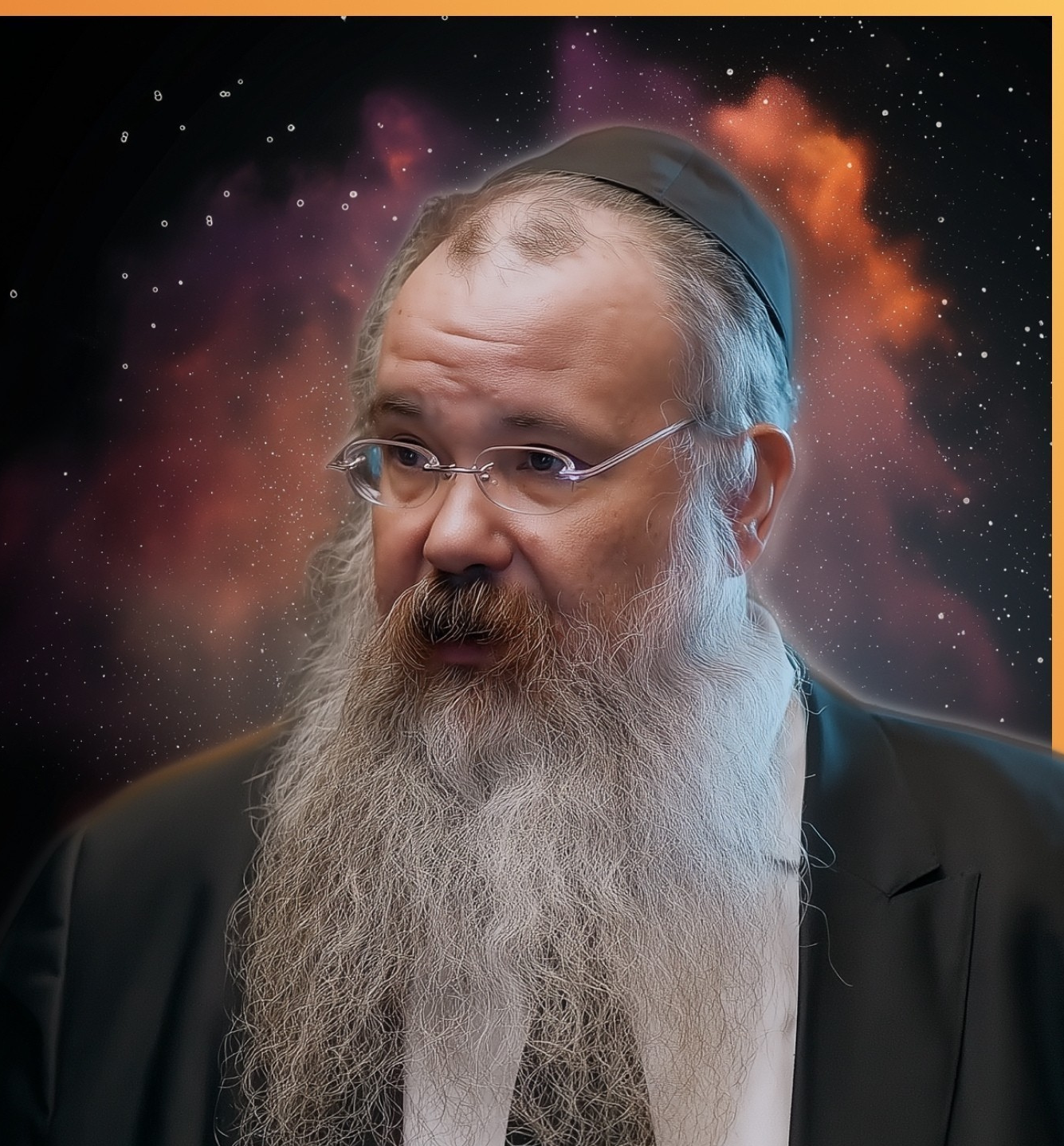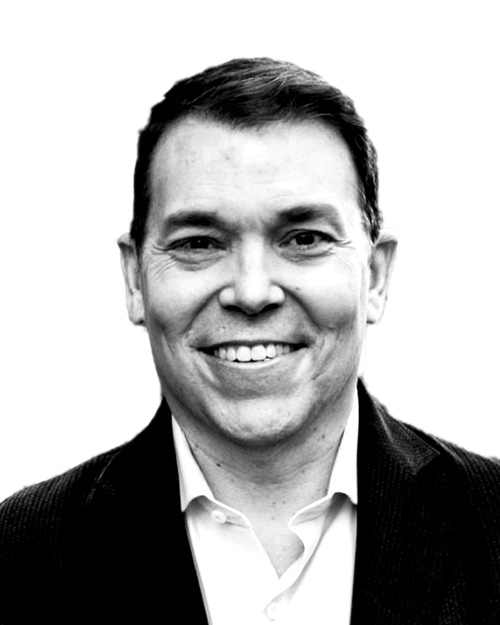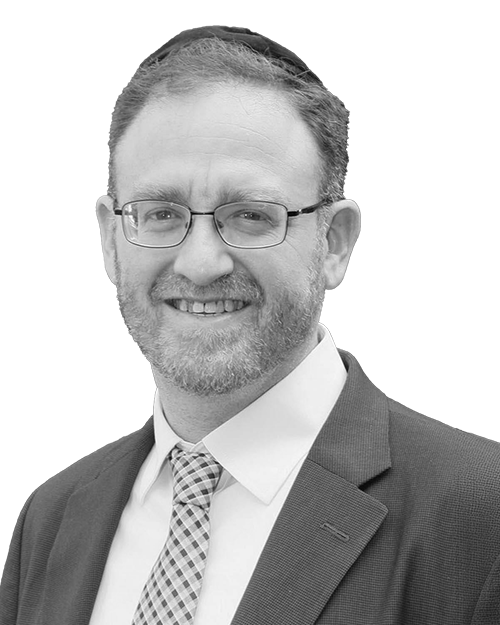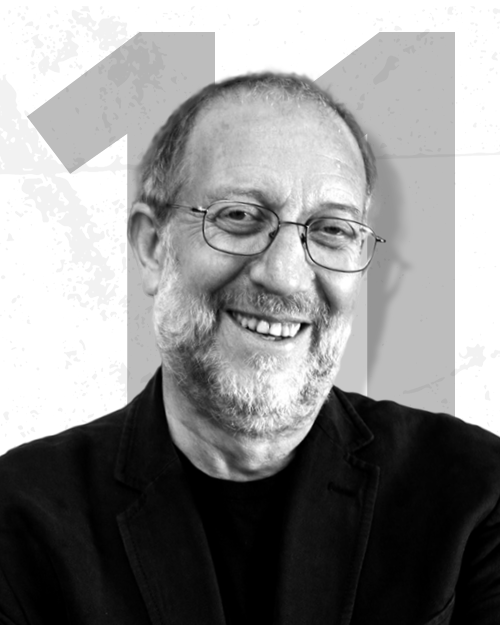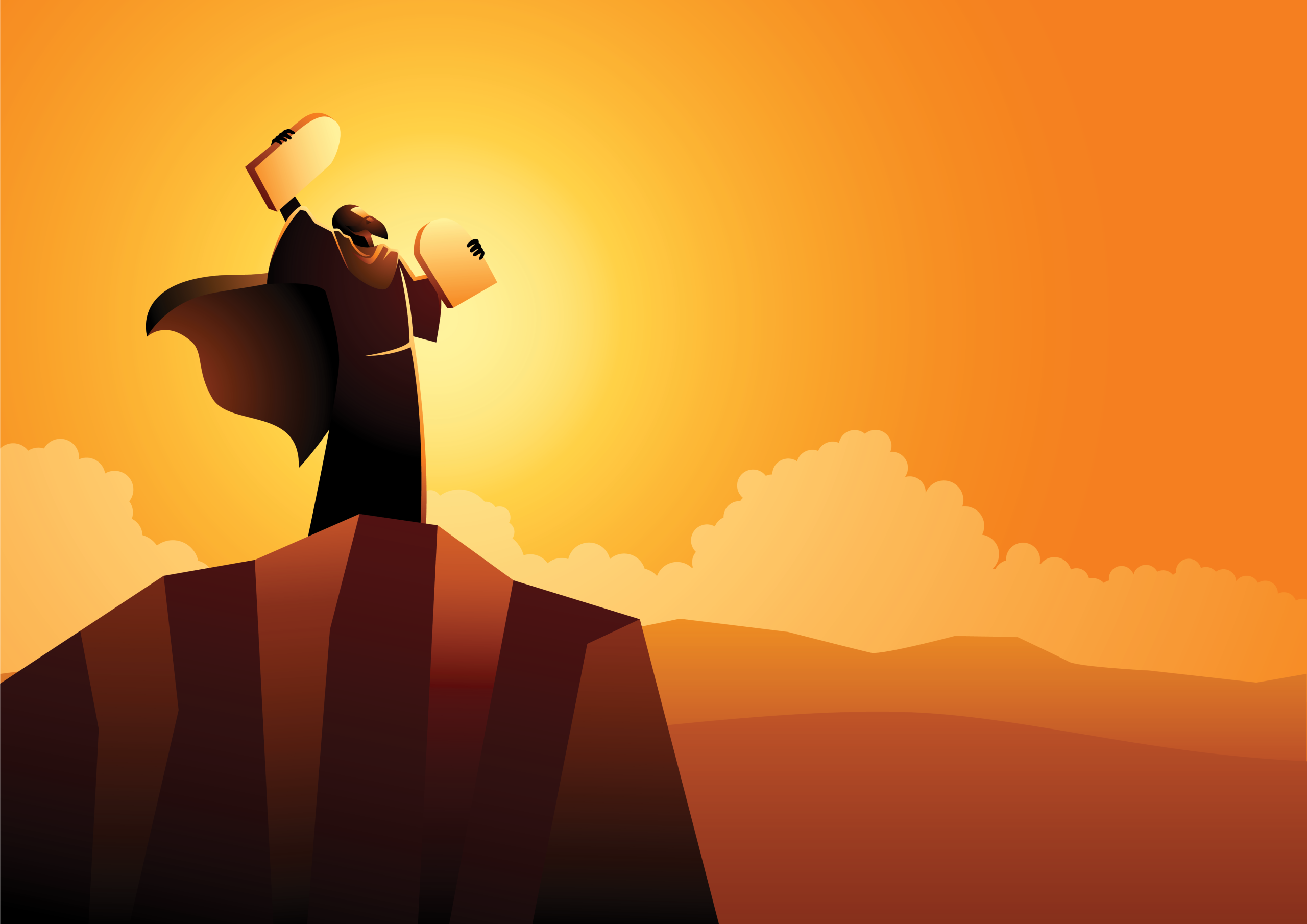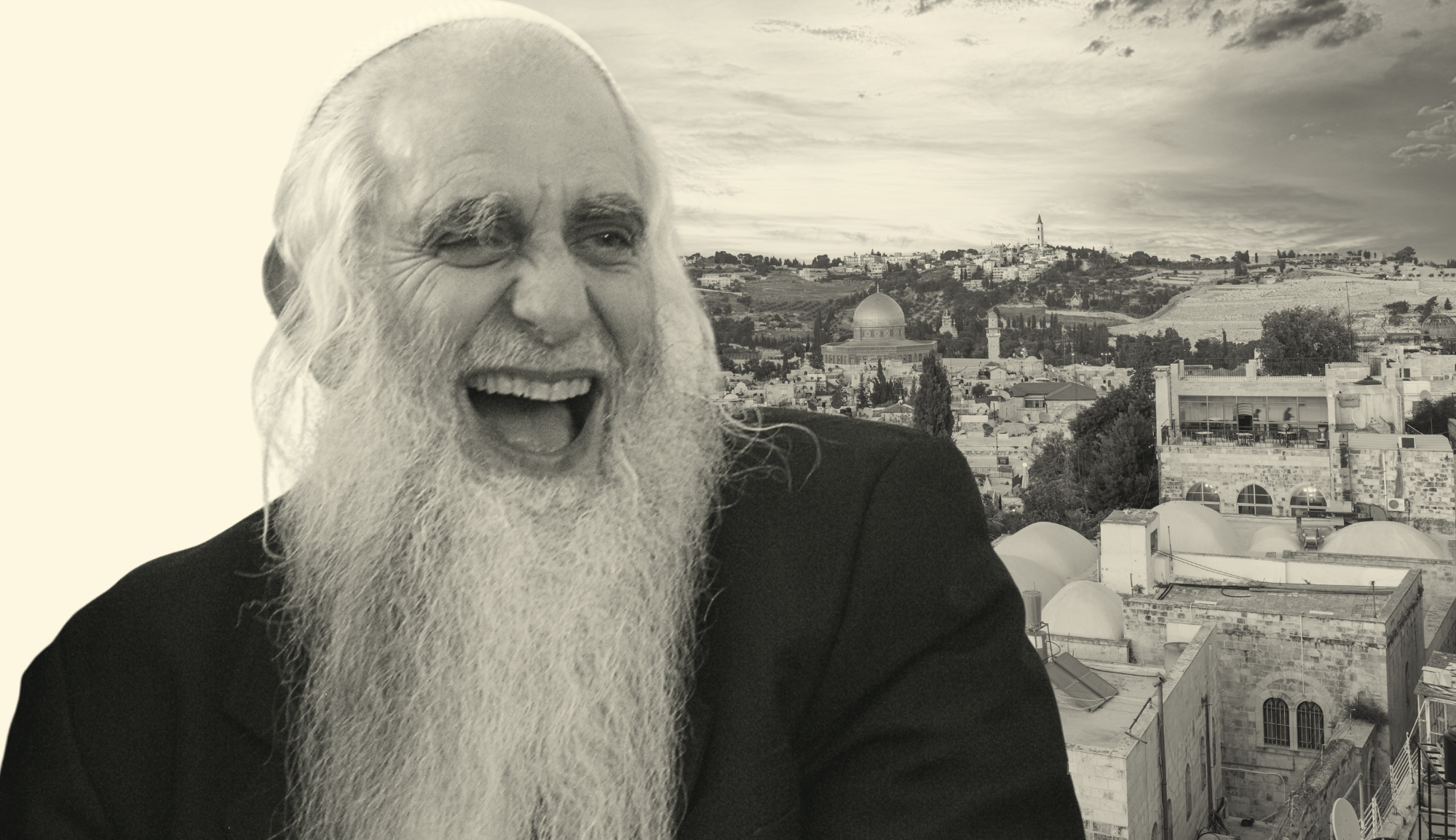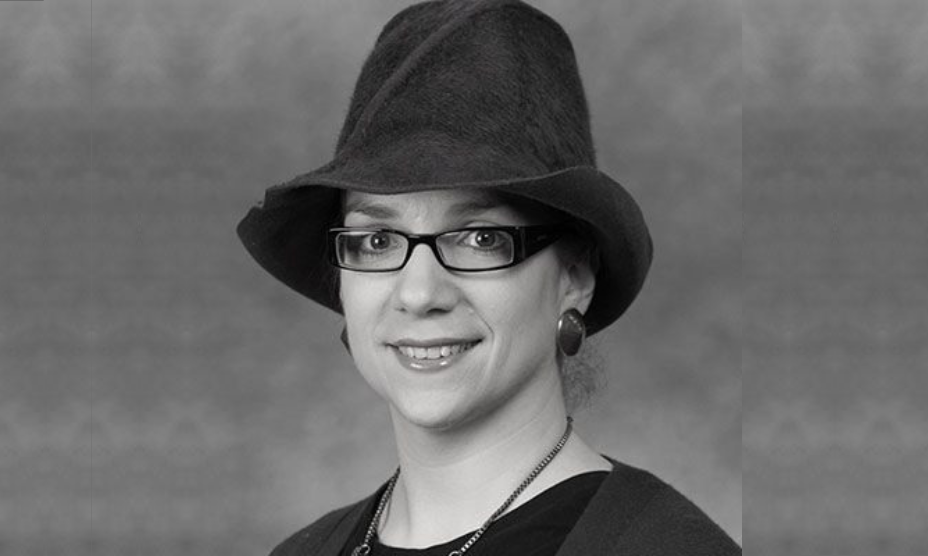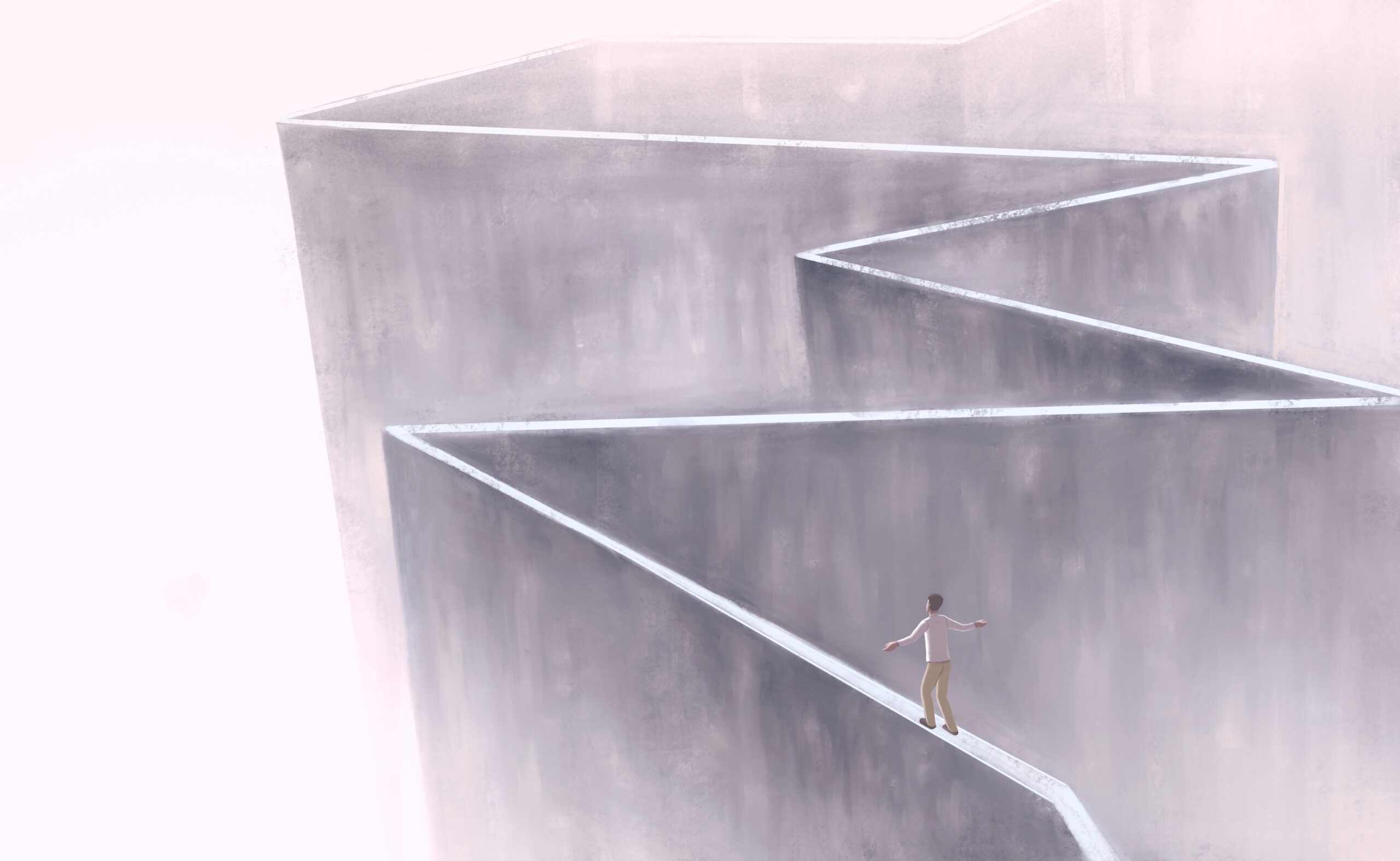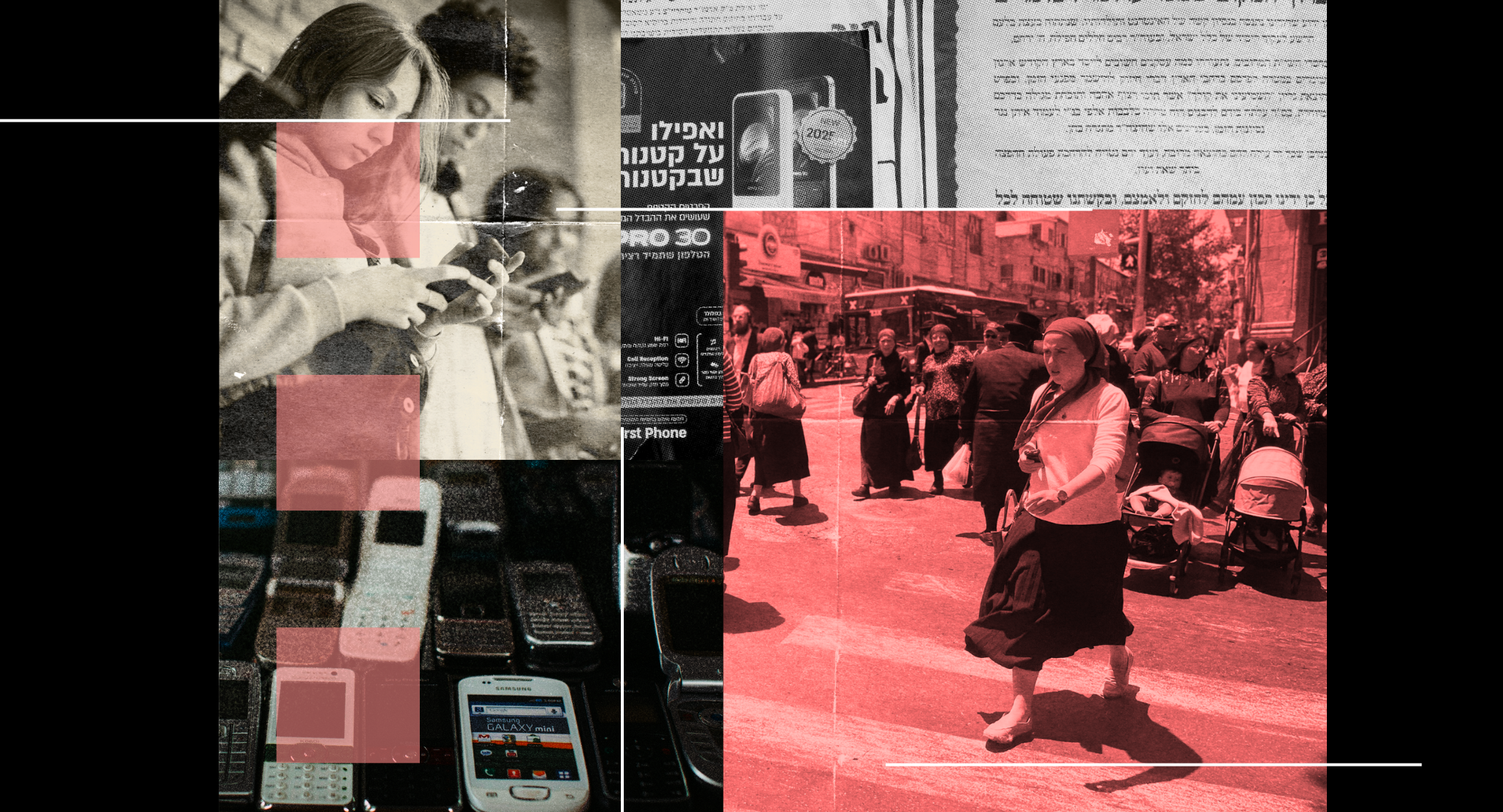Laura E. Adkins: Is There Room for All Opinions?
In this episode of the 18Forty Podcast, we sit down with Laura E. Adkins, the JTA’s opinion editor and an adjunct professor of journalism at Stern College for Women, to talk about how she stays grounded while engaging with so many disparate viewpoints.
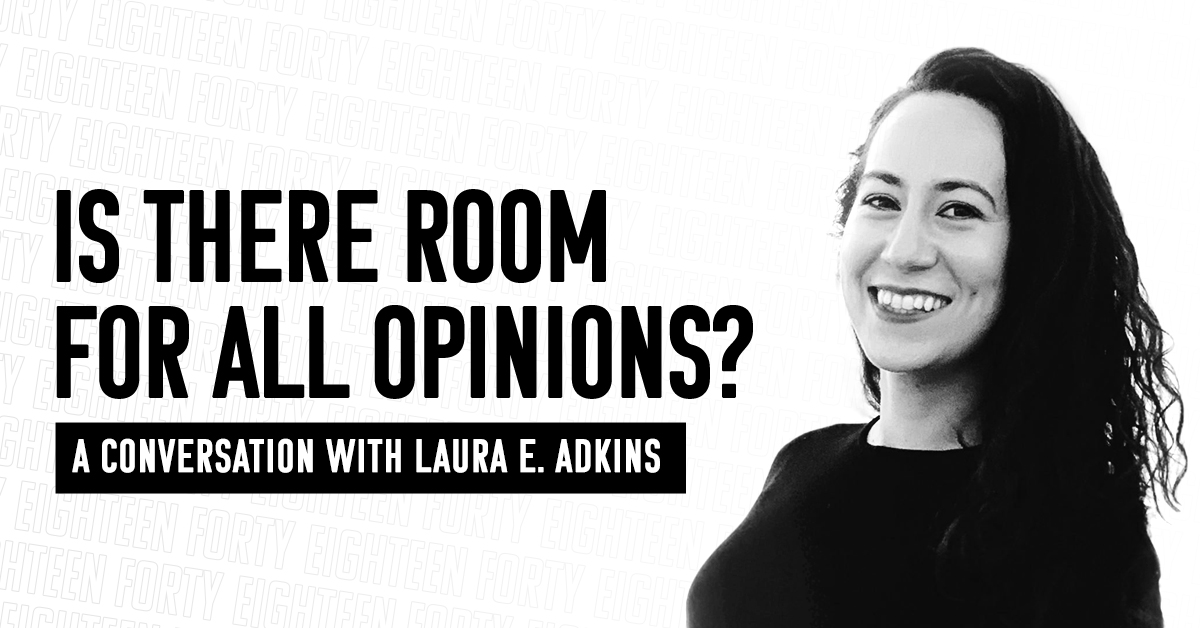
Summary
In this episode of the 18Forty Podcast, we sit down with Laura E. Adkins, the JTA’s opinion editor and an adjunct professor of journalism at Stern College for Women, to talk about how she stays grounded while engaging with so many disparate viewpoints.
Many people live in a perpetual bubble, never allowing themselves to step too far from the lifestyle they feel is comfortable. They may only ever engage with straw man versions of others’ opinions, and therefore may never be exposed to a diversity of ideas and people. As a seasoned journalist – currently the opinion editor of the internationally-syndicated Jewish Telegraphic Agency – Laura is no stranger to subversive opinions and pluralistic attitudes. She is also a baalas teshuva, having forged her Jewish identity by the force of her own will.
- How has she been able to stay grounded and centered in her identity as a person while engaging with so many different people and opinions?
- How has her experience as a baalas teshuva contributed to this?
- What was her journey as a baalas teshuva like?
- How do groundedness and a plurality of opinions and information play a role in modern kiruv (Jewish outreach)?
- And how should they play a role?
Tune in to hear Laura reflect on her journey as a baalas teshuva, the state of kiruv, and the art of remaining true to one’s identity.
For more, visit https://18Forty.org/peoplehood/#adkins
David Bashevkin:
Hello and welcome to the 18Forty podcast, where each month we explore a different topic, balancing modern sensibilities with traditional sensitivities to give you new approaches to timeless Jewish ideas. I’m your host, David Bashevkin, and this month we’re exploring Jewish peoplehood.
For me, the notion of Jewish peoplehood, and this has been a continual theme, is expanding that pallet from which you draw upon when you think about the notion of the Jewish people. I remember, I read in an article written by a Rosh Yeshiva in Yeshiva University, Rav Rosensweig, who wrote an article in Tradition decades ago on the concept of eilu v’eilu divrei elokim chayim, the notion that these and these are the words of God, which is taken from the Talmud in Eruvin, which we recently studied in Daf Yomi. And in that article, it’s an absolutely brilliant article, I remember I actually showed it to one of my teachers in Ner Yisroel when I was there at the time, that’s when I had read it. They didn’t love it as much as I did, which is okay. But in the article that I found really beautiful he cites from a work known as the Aruch HaShulchan, Rav Yechiel Michel Epstein, which is a late 19th century work.
And he has a beautiful introduction to his volume on Choshen Mishpat, which deals with monetary laws, and he has this just amazing imagery that I’ve always appreciated, and I first found it in this article published in Tradition. Again, this is probably 30 years ago at least, I should probably look it up. And he talks about how in the disputes between, in every page of Talmud, everyone, all the rabbis, everybody’s fighting and everybody’s dealing with each other. The imagery he uses is the concept of the Torah being a song. And he writes in that introduction to the Aruch HaShulchan, he writes that in a song, what makes it so beautiful and captivating is the harmonies and the melodies and the diversity of instruments all working together. And in this description he’s talking about Torah and all of the arguments and the fights and all of this that we have, he says those are the harmonies and the melodies. And I think in some way that imagery is helpful when you think about the Jewish people, about the different instruments that we’re given, the different parts and the different role, just some way to wrap your head around all of the very serious disagreements we have in our nation.
And that’s why I’m so excited to introduce the conversation today with Laura Adkins, who has a fascinating story of her own, but serves as the opinion editor for the JTA, for the Jewish Telegraphic Agency. She kind of cultivates the opinion on one of the oldest, most notable, prestigious Jewish media outlets. She cultivates the opinion page, which I’ve always, we discuss on the interview, what a nightmarish job to have to negotiate what opinions work and what don’t and what could be in there. And I think that she brings such a reason and joy in that she’s able to see these disparate opinions, so to speak, as these harmonies and melodies in the larger notion of building out the Jewish people. What I found about her stories even doubly fascinating, which is why I specifically wanted her, is that she came to Jewish life a little bit later in life. She wasn’t raised in a home that had a particularly strong affiliation, and she had to grow and develop through outreach movements and all that stuff. And through that came to land on this job of being the opinion editor for the JTA.
And I’m just so fascinated how diversity of opinion that she manages to negotiate doesn’t erode that conviction and those values that she had to cultivate on her own personal Jewish journey. It reminds me of an earlier conversation that we had with Kelsey Osgood when we were talking about people who leave religion, and she was somebody who was always fascinated by the notion, what’s called OTD, and she herself was a convert to Judaism. I remember talking to her about, you’re coming into Judaism but you’re so fascinated by these stories of people who leave. And in a similar way – it’s not the exact same – I have a similar fascination and appreciation for Laura’s work in that her own journey, becoming more observant, committed, knowledgeable, all of those things, was in concert with being an opinion editor for the JTA.
And normally I think for a lot of us those would be, maybe not mutually exclusive, but would be inversely related. Your ability to feel that sense of commitment and centeredness in Jewish life for many is inversely related to the amount of opinions and ideas and voices coming at you, like, enough already, enough of the content, let me buckle down. I think I’m like that in a certain way. Even though I talk to so many people and read and all these different ideas, when I need that centeredness I just want to shut out, I wouldn’t want an opinion page in my life, but she manages to negotiate both, and I think it’s a testament to the breadth of Jewish appreciation that she has been able to cultivate. And I hope after listening to her that you’ll be able to cultivate it as well. Laura, thank you so much for taking the time to speak today.
Laura E. Adkins:
Hi, thank you so much for having me, I’m excited.
David Bashevkin:
I want to begin by talking about why, in a conversation about Jewish peoplehood, I specifically turned to you. You have a fascinating Jewish journey of your own, of becoming more involved in Jewish communal life, and at the same time, you’re also professionally the opinion editor for the JTA, which if you were to ask my advice, somebody who comes later in life to Jewish communal life, the last job you want is being the opinion editor for a major Jewish publication. That’ll send you running in the other direction. So maybe we can begin – and we’ll get to that – by explaining a little bit about how you were raised, your religious background growing up, and where you are today.
Laura E. Adkins:
Sure. I did not have a traditional Jewish upbringing at all, celebrated Chanukah and that’s about it, on my own. When I got to NYU, or NY Jew as it’s affectionately known by some, I dove headfirst into both the communal Jewish life with which most people associate with, the traditional baalei teshuva experience, but more importantly, NYU had an amazing Kollel program and learning opportunities pretty much daily, and I very quickly got plugged in with chavrutot and learning Jewish texts on a very intense level. And as someone who spent most of high school involved in speech and debate, I loved how Jewish tradition plays out on the page as a series of intellectual discussions aimed at getting closer to the truth rather than in dogmatic ways. I’ve always been an ideas person, which is maybe why I don’t bristle at having the big task of deciding which Jewish opinions get elevated in the JTA and our 70 plus client publications, but I have always been attracted to the warmth and beauty of Jewish communal life, but also the very I think beautiful process by which we establish community norms and get closer to the truth of ideas.
David Bashevkin:
At what point did you realize that colloquially there’s a meta process that you’re being involved in called becoming a baalas teshuva? I don’t know if you self identify that way, but you had these classes, you had chavrutot, you had an upbringing that was divorced from this in many ways it sounds like. So at what point did you realize, “Oh, I’m involved in so to speak this machine that’s trying to get more affiliation”?
Laura E. Adkins:
It’s interesting. I don’t generally identify as a baal teshuva just because of all of the assumptions that come along with it, but in some ways I was very insulated from those stereotypes because college is such a place of intellectual rigor and of reinventing and finding oneself in so many ways, so I never felt judged by my rebbeim or my peers for being at a different place in my religious journey. I really do see the idea of putting baalei teshuva in a separate category as something that’s not super helpful when we’re looking at creating Jewish peoplehood, or even just determining the truth of ideas.
David Bashevkin:
I think that’s really well said. I’m going to read to you something that you wrote, a really lovely piece addressed to the freshmen of NYU. It said: “You are the only one who can define your Jewish identity. My freshman year, I spent a good six months of my life utterly anxious and feeling guilty about the fact that I considered myself Modern Orthodox, but I still prefer to exercise in shorts and a T-shirt. I spent an inordinate amount of time stressing about this halakhic immodesty and what effect it would have on others’ perception of me in the community. At the end of the day, no matter whether you eat bacon on Yom Kippur or observe all Halakha as stringently as you can, you are a Jew and you have a role to play in the global Jewish community.” Which is so moving, but I’m wondering if you could talk a little bit more, because you kind of dismissed it when you said it right now, about those feelings of being utterly anxious and feeling guilty. How did you learn to overcome that, assuming you even did?
Laura E. Adkins:
The more I live in this world and form deep relationships with Orthodox Jews, the more I realize that everyone is dealing with, whether it’s internal guilt or feelings of shame and secrecy around things that they’re struggling with, whether that’s, I have a few close friends that are recently divorced or outwardly observant but really struggling with whether or not they believe in God at all. I think in a lot of ways having social cohesion and the subtle and not so subtle ways in which we pressure one another to uphold communal norms is what holds us together, but the shadow side of that is that we all are feeling I think some degree of anxiety all the time. But I think it also gives me personally a greater degree of humility when I realize, no matter how hard one works, there’s no such thing as a perfect Jew. Even though you may assume that they’re holding a certain way or practicing or thinking a certain way, everyone is so unique in their thoughts, ideas, challenges.
David Bashevkin:
For a lot of people who go through a religious development in any way, in any direction, it could often put stresses on the childhood context that you grew up in. How did this affect the relationship you had with your parents and siblings?
Laura E. Adkins:
I think that they at first just thought it was a college phase, but my family is super accepting, asks a ton of questions, and I really do think that they’ve seen my process with respect, even if they don’t fully understand it. I think as long as you approach one another with curiosity rather than judgment, that’s the best way to maintain relationships. And I think, not that you brought up Kiruv, but a conversation that I have a lot of the time when either people ask me how they can motivate others to do what I did or when just talking about the idea of Kiruv in general, I actually don’t think it’s so helpful when we approach it with the attitude of Orthodox good, secular bad. We need to help people get up to a certain level. It feels very condescending to me, even though my own personal decision and evolution has been towards a more Orthodox observance level, I think that people can tell very easily when we dismiss or diminish their humanity and their own intellectual rigor.
David Bashevkin:
So I actually do want to talk about Kiruv, and I’m actually quite thrilled that you brought it up, because in some ways you could be seen as the poster child of Kiruv efforts. Somebody who came into the Jewish community with little background, and through programming and educational initiatives developed a deep-rooted religious identity of her own. At what point in that process – this is kind of what I was asking – did you realize that there was such a thing called “Kiruv”, and what advice would you give to the people involved in that? What really worked well for you? Because you’re the poster child, you can talk about what you feel could be enhanced and made even more welcoming or effective.
Laura E. Adkins:
I’m a bit of a weird case because I reached out on my own, I wasn’t approached, it was very hashgacha pratis. I had an Orthodox Jew in all of my classes first semester freshman year, and through speaking with them got curious and reached out to the Orthodox rabbi on campus, who obviously was not answering my emails because it was Sukkot, and met with him. And I was like, “I want to take this seriously, what books do I read? How do I get plugged in?” I will never forget this. He compared the strains of Judaism to interpretations of the second amendment. And he said, “Orthodoxy is the traditionalist interpretation of the second amendment. It says the right to bear arms shall not be infringed. We take it as meaning that, and that’s what it means.”
Conservative looks at the historical context and what they were meaning at the time, and Reform looks at it as, that’s a suggestion but we need to use our own brains to figure out what exactly we should do. And I liked that because it was very clear that he was coming from an Orthodox context, but was immediately open about the fact that he had colleagues in different denominations that he respected, that he could connect me with. I really appreciated being taken at face value with my questions and with an element of curiosity, and I learned with him and other rebbeim and other friends for all four years at NYU. At no point did anyone, I think, tried to quote-unquote “Kiruv” me.
David Bashevkin:
When you say it as a verb it sounds so terrifying.
Laura E. Adkins:
Look, I am not the smartest person, but I think I’m smart enough to know when someone’s trying to sell me something. And there’s a very fine line between going to someone that you know is in a vulnerable place and taking advantage of that, and engaging with another human being and being very transparent about your beliefs and the beauty of our tradition. I like to think that our tradition can speak for itself in a lot of senses. I don’t want to cast aspersions on anyone who makes Kiruv their life work, and I don’t think that most people have this attitude, but it’s very easy to treat Kiruv like you would any other business decision. Quantifying people by the number of shabbatot they’ve kept in a row, or programs they’ve come to. And it’s just utterly dehumanizing on a certain level when we treat Jews as countable and commodifiable in that way. I think when we’re approaching individuals it’s important to remind ourselves that even though we may see ourselves as at a higher level of observance, no one has a monopoly on truth.
David Bashevkin:
I’m so fascinated by that and it really resonates with me. I also bristle at the notion of the quantifiability that marks a lot of outreach efforts. I feel like a lot of Jewish institutional life has been about professionalizing, engagement metrics. Is there any way to avoid that in Jewish institutional life?
Laura E. Adkins:
I actually interned for Hillel International one of my years at NYU, and we tracked the number of coffee dates we had with people. I remember being shocked to see my own name in the back end of the system as someone who had been coffee dated. Thinking back on those interactions, I never felt that there was a specific agenda other than the goal of connecting Jews with other Jews and with Jewish experience on campus. And obviously the goals of Hillel International and their funders are a lot different than Orthodox organizations. But I think taking a step back and thinking about our actual long-term goal is really important. What do we want for the Orthodox community? I think most people would say, “We want continuity. We want engaged people who are sending their kids to day school, and members of synagogues, and contributing to Orthodox life.”
But when we take a step back, I have a lot of friends who are baalei teshuva but went through the more traditional system of being Kiruved, enjoying Shabbat meals, and some of them have come to me and said, “Laura, I barely can read Hebrew, I don’t know anything about Halakha, I ask shaylas on the most basic of Jewish observances, and I don’t even know if I want to keep doing this.” When you’re someone that’s becoming religious, everyone is reaching out to you, and the second they feel like you’re frum, it’s no longer, “Oh, let’s draw you in,” it’s, “You’re on your own”. If we focus just on bringing people in and not what happens to them and their quality of life once they’re in, we’re not building a sustainable community. I don’t know what to tell those people.
They were promised at seminary or Yeshiva that they would find their bashert within a year, and then, I had one friend who said, “If you don’t talk to girls for a year you’ll be married within the next year.” And then, when that doesn’t happen, people are devastated. I think we really need to keep in mind that people take us seriously, and the power of our speech is such an important idea in Jewish thought and tradition, and that includes what we promise when we bring people in.
David Bashevkin:
I could not agree more. I have a lecture on YU Torah that actually talks about the dangers of manipulation when you’re bringing people into Jewish engagement. One of the things that I always say is, “You can’t just educate the 15 year old or 20 year old in front of you, you have to educate the future 30 year old, future 40 year old that they God willing will become. So that definitely resonates. Maybe we could talk a little bit – and you’ve already touched upon a lot of this – you are the opinion editor at the JTA. You are navigating so many opinions from personalities and ideas that do not cohere with one another, they contradict. A lot of the contributors and people who you choose to publish, they probably couldn’t even be in the same room with one another. They really, really disagree on fundamental issues. How do you keep your own centeredness in your Jewish values when you’re negotiating with so many contradictory and oftentimes mutually exclusive opinions on issues related to Jewish life and the Jewish people?
Laura E. Adkins:
First of all, I would push back about the idea that people can’t be in a room together. I actually think the more we force people into rooms together, the more we see one another’s humanity. It’s very easy to tear down a straw man, or a steel man, or this idea in our heads of the Trump supporter, or the Hillary supporter, or the Orthodox Jew, or the settler, or the Israeli, or insert your preferred bogeyman. But when we’re actually forced to engage with one another, both the ideas of one another and actual people behind those ideas, it makes it a lot harder to be blustery. I almost think of it in my head sometimes as pulling together the same way I would plan a Shabbat meal. With a Shabbat meal, it’s literally just, we’re having dinner together, we’re going to be civil to a certain extent, we’re going to eat and have a lot of fun.
The standards for the opinion section, I think, are, you have to be interesting, you have to be reasonable, and you have to be offering a novel idea. It doesn’t threaten my Orthodoxy to run a piece challenging fundamentals of Orthodoxy. In many ways, my personal views are irrelevant except in so much as they shape my understanding of the topics that people are trying to explain. I don’t think objectivity is real for opinion writers, and I think that drawing out the writer’s lived experience is actually helpful. Maya Angelou, the wonderful poet, once said, “People don’t remember what you said, they remember how you made them feel.” I think that’s certainly true in opinion pieces.
David Bashevkin:
We launched the 18Forty media site, and I do something similar on Twitter where I try to navigate through a lot of different personalities that don’t fall within a very simple box. And I’m very rarely attacked, but I do get the question of, “Should I be reading this? Should I be listening to this?” Because there is an underlying sentiment, particularly in the Orthodox community, but I think in every culture, that in order to build the cultural capital that will allow you to survive and have the motivation to preserve who you are, you need to kind of stick with like-minded people, and you need to have these boundaries. Would you tell somebody who is identifying as a baalas teshuva and coming into the Jewish world saying, “Should I be reading the JTA opinion section? Meaning isn’t that going to pollute the cultural capital that I should be building right now?”
Laura E. Adkins:
First of all, when you tell someone not to read something, the thing they want to do most is read it. But if we’re really grounded in our values and our beliefs, I don’t think that hearing dissenting ideas and beliefs are harmful. I do think that we need to give children a solid foundation and teach, what does Judaism believe? I think the Yeshiva Aish HaTorah was the first to engage with questions of, not practical Halakha and Yeshiva, but does God exist? How do we know? How do we think about these cosmic questions? There’s a lot of people who grew up Orthodox that just never think about these big questions, and it works for some, and it doesn’t work for others. So I think if we engage in these big questions and don’t shy away from them early, that can only strengthen our sense of identity and the strength of our beliefs.
But I think, again, everyone needs to figure out what’s going to work for them. I read Mishpacha, I read Vogue, I listen to all sorts of music, but just like I would tell someone who is depressed not to listen to depressing music if it makes them more depressed, I think if you’re really struggling with something, then you need to figure out the types of information and external things that you’re bringing in and how that’s going to support your own development. I’m very happy for people to read the JTA. I don’t think the Jewish Telegraphic Agency’s opinion pages are the only source of nuanced debate. I am pro reading as much in general as possible, but I think it does get into a good question of, how do we build the most solid foundation for ourselves? And I think ironically, the more we interrogate our own beliefs and why we do what we do and ask questions of others and ourselves, the stronger that foundation becomes. We’re not training a generation of robots, we’re training a generation of committed, observant Jews who have a solid foundation. And ultimately I’m Orthodox not because I believe we have a monopoly on truth, but because I think that we have the most solid roadmap and foundation for living a centered, grounded, helpful life for others and for ourselves and for humanity. So I don’t know that losing our sense of questioning is helpful.
David Bashevkin:
Incredibly well said, as always. We’ve spoken a lot about having opinions that are more subversive. How do you stay grounded when you look to what’s colloquially felt as the ultimate embodiment of Jewish values, the right-wing Orthodox community? Culturally, there’s a certain sense of authenticity that it’s hard to deny that they have. And when you look to the right you see that there are some policies where the role of women in there is so different than the way you live your own life. How do you make sense of that and still be able to feel connected with that very large segment of the Jewish community?
Laura E. Adkins:
I’m going to push back at your framing a little bit. You asked how I conceptualize reaching out to the right. I don’t think of it that way. I phrase my emails to the editors at Mishpacha the same way I would to a Palestinian pollster or one of the people that writes for me all the time. I again don’t think I have a monopoly on truth. I personally get a lot of humility when I remember the fact that 90% of American Jews aren’t Orthodox. So if we’re going back to numbers, the ultimate embodiment of Jewish values is thinking that humor is the biggest indicator of being a Jew, and supporting Israel is the number one tenet that all Jews agree upon. And my views may align more with Mishpacha than a secular Jewish publication, but not necessarily.
I think Jewish history is full of this complexity of what it means to be Jewish and to embody Jewish values. I don’t have trouble thankfully reaching out to Ami or Mishpacha or Orthodox people because I think, thankfully, I have a reputation and I strive to treat every topic fairly. And I certainly slip up sometimes, and I certainly, my own reporting is not necessarily things that Mishpacha would cover all the time. But I think when we’re very honest with who we are and what we represent and what we’re striving for, then we’re able to have relationships with a wider swath of the Jewish community.
I don’t think we do anyone any favors by either pretending that Mishpacha is the same as The Jerusalem Post or any other Jewish publication, and we also don’t do ourselves any favors when we pretend like the only relevant conversation about Mishpacha is whether or not they have photos of women. I think it’s an important conversation, but Mishpacha does a lot, and there’s a lot that they put out into the universe to engage with and discuss and have opinions about, and I just think reducing them to one issue isn’t helpful for anyone.
David Bashevkin:
Incredibly well said. I’m wondering if you could talk a little bit about your thoughts on pluralism. And maybe the way you could dive into this is to talk a little bit about pieces that you rejected, not because of the writing quality or it wasn’t timely, but you didn’t think that this was an opinion that was justified within the JTA, or pieces that you’ve published that you were criticized for publishing.
Laura E. Adkins:
I think any piece that engages with a difficult or controversial topic is going to get criticized. I often find that the pieces that fall outside of what we would publish, it happens to be that people with quote-unquote “unacceptable opinions” often tend to espouse them in a way that’s not palatable or doesn’t meet our standards. I certainly have rejected pieces that I think flatten the identity of a group, whether it be Palestinians or Orthodox Jews or non-Jews, that is a big red flag to me. I think pieces where someone may hold a perfectly reasonable opinion but they don’t really have any grounds to be making that argument. What I’m looking for is either a personal connection to the issue or demonstrable expertise on the topic. I think there’s the obvious hateful or oversimplified pieces, and then there’s just, I want people to write pieces that they’re going to feel good about that add to and advance the conversation, and I think the best way to do that in the opinion section is to speak from one’s experiences.
David Bashevkin:
So let’s talk a little bit about the reflecting on the past year, 2020, and going forward. The Jewish community, this has been a really trying year, perhaps every year is like that and it’s just psychologically the most recent year feels like the most difficult. We’ve certainly faced a lot of challenges this year, and I’m wondering if reflecting on this year and looking forward, what do you see as the biggest existential threats to the Jewish community, both internally, that we are creating ourselves, and externally, that the world is imposing on us?
Laura E. Adkins:
I’ve been thinking about this a lot with the debate about whether or not to reopen schools in the fall. It’s this vicious cycle, because the people that have access to speech in the public marketplace, myself included, are those who come from a certain degree of privilege or luck. I certainly have student loans, but I went to an amazing public school, my parents helped me through school, I got into a top 35 university, I used my connections to get internships at good publications, I have been able to focus on my work because I’ve never had a month that I didn’t know how I was paying rent or my grocery bills.
And there’s a lot of people that are really hurting right now that just aren’t able to be listened to for whatever reason. I’m thinking now of particularly the hundreds of thousands of public students in the New York City public schools who are either facing food insecurity, or don’t have Internet access, or are in abusive situations, and no one’s really fighting for these kids right now. We’re having these conversations that are important about, “Should I homeschool my kids? Should I send them to school? Should we do Zoom?” And that’s a really privileged conversation. The New York Times had an amazing piece on the percentage of people in this country that don’t have Internet access and couldn’t tap into it. Stories of people driving 45 minutes to get to a McDonald’s parking lot so they can do their homework.
There is a pervasive Jewish poverty problem in this country and in Israel. And we talk about it a little bit, and I think the Orthodox community does a good job of putting out fires, so to speak. If God forbid a parent dies, or a house burns down, or someone is in an obviously terrible situation, we rally together, but most Americans can’t, or a big percentage of Americans can’t afford an unexpected $400 expense. And with federal unemployment running out soon there’s a lot of families that are going to be put deeper into this cycle of poverty. I was speaking to a writer at an Orthodox publication recently about the extent to which Jewish Americans have privilege. And he said, “I always bristle at this notion, but then I started asking questions about, well, when we first got here a couple hundred years ago, my family, we were able to buy a farm. How were we able to do that? Well, we borrowed money from a relative, and we started ourselves on this American dream that a lot of people don’t have access to that starter capital or to the resources of a community.” It’s not just the Orthodox Jews in poverty I’m thinking of, but the unaffiliated Jewish Americans and other Americans and Israelis who are really hurting right now. So I think in the same way that the 2008 housing crisis and recession set a lot of people of our generation back in terms of those cycles of poverty, we’re going to see that again. So that’s certainly the big external threat that I’m thinking about.
And then I think the internal threat is, I don’t know, there’s so much, I’m thinking of the debate between man and man and mitzvot between man and God, is there even a way to actually separate them because everything is so interconnected? I think in some ways the Jewish community has responded astoundingly well to the challenges of COVID-19. Rebbeim issuing very powerful declarations about staying inside, and social distancing, and making halakhic innovations to help people with ritual observance, even when it’s really hard to do so in a traditional way. I think unfortunately there are a lot of challenges that just, we’ve had a ton of deaths, and I think it remains to be seen how we handle those in the months and years to come. That’s the immediate things that I see. It’s darkly funny. Six months ago, if you would’ve asked me what the biggest challenges were, I would have been talking about antisemitism in Brooklyn, and attacks on Orthodox Jews of a physical nature from other humans. And now our lives revolve around this virus. I think the Jewish community is remarkably agile in many ways, and that’s one of our biggest strengths. So I think the challenge is just continuing to adapt to the challenges that are thrown our way.
David Bashevkin:
So that’s a great segue to my final question before we get into the rapid fires. And that is: I imagine that the anxieties and the guilt that you wrote about to the freshmen class still pop up every once in a while in places, and I’m wondering, where do you turn when you need to feel heartened, to feel optimistic and joyful, about the Jewish community?
Laura E. Adkins:
It’s a good question, this comes up a lot. I got a lot of flack several years ago when I wrote a piece about Shlomo Carlebach’s alleged sexual predation. It comes up when that topic unfortunately resurfaces in the community. I think for me, my faith is in Judaism, not Jews, to a certain extent. There was unfortunately another incident recently, not of a sexual nature, but of a financial corruption, one that’s ongoing. I think for a lot of people, when a powerful rabbi does something really terrible, it shakes their faith in Judaism, which is very unfortunate and very real. Power corrupts – that’s true in the Jewish community, that’s true outside of the Jewish community – and Jewish tradition is full of examples of powerful people doing terrible things, murdering other Jews, letting empires fall just doing –
David Bashevkin:
Laura, I don’t want to cut you off, but I’m going to be honest: in the response to the heartening question, right now, I’d probably flunk you on this one.
Laura E. Adkins:
Look, I think it’s important to be real about the challenges. I think there are a lot of challenges, and I think to shorten it, I think what I draw strength from is the fact that humans are human and God is transcendent. We can acknowledge that Jews are human, and fallible, and also tap into all the good things that Judaism has to offer. When I’m dealing with personal challenges I think my example would be the same as any person. I have amazing friends, I have great relationships with my family members, I run long distance, I play lots of instruments, I watch Netflix like a lot of people do. So I think just being honest with yourself about the realities of things and not putting people on pedestals is really helpful for when they fall.
I would not endorse, something that I’ve seen I think within the last few decades in the Orthodox community, this idolization of rabbis, people having pictures of rebbes in their living room. I have a very complicated feeling about it because, on the one hand, a lot of these people did amazing things, and on the other hand, if your relationship to Judaism is contingent upon the actions of man, that’s… Man is fallible. I’m looking now at my picture of several rebbeim that I have on my sefarim shelf, but it’s a picture from the Talmudic story of the rabbis who went out into Gan Eden, and one died, one went crazy, one became a heretic, and rabbi Akiva was saved because he kept in mind: “What can I bring back to the real world to help other Jews elevate themselves?”
I think a lot of people, if you said you have an opportunity to go to Gan Eden, they would just say, “Amazing, enjoy it, have fun, just soak in paradise.” But I think in that same way that really grounding oneself to the reality of, “Life is not Gan Eden, and we have to bring back the wealth from our tradition because life is real, life is not Gan Eden.” And if you keep that in mind when you’re tapping into our tradition, that you are going to meet real life challenges… I recently did an in-depth study – or an in-depth class – through Nishmat of the book of Iyov with someone who had lost a son in a terrorist attack. And for a lot of people that would shake their faith to the core, but I was so moved by Rabbanit Henkin’s ability to engage with the messiness and the deep dark incomprehensibleness of this world, but not lose faith. So maybe it’s a dark answer, but I think I draw strength from just keeping in mind that real life is not paradise, and being Orthodox does not mean you’re not going to have significant real challenges.
David Bashevkin:
What books would you recommend that played a role on your Jewish journey for people who want to explore more about their Jewish identity?
Laura E. Adkins:
I always joke that the first Rabbi Sacks book you read is your favorite because I think he has such a strong message, and it permeates all of his books. I read A Letter in the Scroll first, I was so moved by his telling of the Jewish story through that.
David Bashevkin:
If you were given an all expense paid two years, three years, however long it took, to write a PhD, what do you think the topic of your dissertation would be?
Laura E. Adkins:
No question, it would be the evolution of Orthodox Jews in America as a political entity. I would love to do a deep dive, not just into the traditional centers of power, but how women are really pushing a lot of leadership initiatives now, and how the relationship between the United States and Orthodox communities have changed and crystallized over time.
David Bashevkin:
Laura, thank you so much for your time and for your incredibly profound and powerful words and experiences.
Laura E. Adkins:
Thank you for having me.
David Bashevkin:
I think any time that I speak to somebody, and followers to this podcast definitely have noticed this. There was a great comment by a friend John Kroll who was kind of reading into – Rabbi Jon Kroll – who was reading into the different words that I use, “fascinating”, “interesting”, for when I don’t totally agree, I’m not really so into it, and I’m uneasy with what’s being said, and we’ve addressed that before in the past, that’s certainly come up. And really with every interview I rarely find it resonating in a deep way, the thoughtfulness, everything that’s being said. There’s always something when you’re talking to somebody, like, “Eh I don’t totally see it that way.”
I’m not trying to convince anybody of everything, I’m trying to have conversations that highlight the way people negotiate their ideas. But I think one of the exceptions was actually speaking with Laura. I just found her thoughtfulness, groundedness, centeredness in the way that she manages all of the opinions in Jewish life while still remaining so centered and authentic in her own commitment to be, for me, really… It was really inspiring, and it’s something that I look for myself. I don’t think I emote or exude that same groundedness, and I wish I did, and she certainly holds that example. I guess for others listening it’s worth thinking about how to negotiate all of the diversity life that we’re all bombarded by – there’s nobody who isn’t – but how to negotiate that without allowing it to erode that centeredness in who you are and what you really think.
I think a lot of times that requires you having those thought experiments. What if I lived elsewhere? What if I lived differently? And it really clarifies with you, to you, so to speak, that original analogy of taking the pot off of the fire and getting to look at how much water is inside. So thank you so much for listening, and I hope you enjoyed the conversation. It wouldn’t be a Jewish podcast without a little bit of shnorring. So if you enjoyed this episode, please subscribe, rate, and review. Tell your friends about it. It really helps us reach new listeners and continue putting out great content. If you’d like to learn more about this topic or some of the other great ones we’ve covered in the past, be sure to check out 18Forty.org. That’s the number “one eight”, followed by the word “forty”, F-O-R-T-Y.org. You’ll also find videos, articles, and recommended readings. Thank you so much for listening.
Recommended Podcasts
podcast
Elisheva Carlebach & Debra Kaplan: The Unknown History of Women in Jewish Life
We speak with Professors Elisheva Carlebach and Debra Kaplan about women’s religious, social, and communal roles in early modern Jewish life.
podcast
Haviv Rettig Gur: ‘Hamas is upset the death toll in Gaza isn’t higher’
Haviv answers 18 questions on Israel.
podcast
Menachem Penner & Gedalia Robinson: A Child’s Orientation
In this episode of the 18Forty Podcast, we talk to Rabbi Menachem Penner—dean of RIETS at Yeshiva University—and his son Gedalia—a musician, cantor-in-training, and member of the LGBTQ community—about their experience in reconciling their family’s religious tradition with Gedalia’s sexual orientation.
podcast
Chava Green: ‘From God’s perspective, men and women are exactly the same’
Dr. Chava Green joins us to discuss the role of women in the Messianic Era and seeing God in the everyday.
podcast
Chava Green: What Is Chabad’s Feminist Vision?
In this episode of the 18Forty Podcast, we talk to Chava Green—an emerging scholar who wrote her doctoral dissertation on “the Hasidic face of feminism”—about how the Lubavitcher Rebbe infused American sensibilities with mystical sensitivities, paying particular attention to the role of women.
podcast
Einat Wilf: ‘Jews Are Never Allowed To Win, and Arabs Are Never Allowed to Lose’
The true enemy in Israel’s current war, Einat Wilf says, is what she calls “Palestinianism.”
podcast
Eitan Webb and Ari Israel: What’s Next for Jewish Students in Secular College?
We speak with Rabbis Eitan Webb and Ari Israel about Jewish life on college campuses today.
podcast
Why 1840?
In this episode of the 18Forty Podcast, we sit down for a special podcast with our host, David Bashevkin, to discuss the podcast’s namesake, the year 1840.
podcast
Pawel Maciejko: Sabbateanism and the Roots of Secular Judaism
In this episode of the 18Forty Podcast, we talk to historian and professor Pawel Maciejko about the false messiah Sabbatai Zevi, Sabbateanism, and the roots of Jewish secularism.
podcast
Eitan Hersh: Can the Jewish Left Talk With the Jewish Right?
In this episode of the 18Forty Podcast, we talk to Eitan Hersh, a professor of political science at Tufts University, about teaching students of radically different political and religious views how to speak to one another.
podcast
Shais Taub: ‘God gave us an ego to protect us’
Rabbi Shais Taub discusses how mysticism can revive the Jewish People.
podcast
Liel Leibovitz and Lisa Ann Sandell: When A Spouse Finds Faith
In this episode of the 18Forty Podcast, we talk to Liel Leibovitz and Lisa Ann Sandell about what happens when one partner wants to increase their religious practice.
podcast
David Bashevkin: My Mental Health Journey
In this episode of the 18Forty Podcast, David Bashevkin opens up about his mental health journey.
podcast
Mark Wildes: Is Modern Orthodox Outreach the Way Forward?
We speak with Mark Wildes, founder and director of Manhattan Jewish Experience, about Modern Orthodox outreach.
podcast
Bruce Feiler: The Stories That Bind Us
In this episode of the 18Forty Podcast, we talk to author Bruce Feiler about family narratives.
podcast
Ken Brodkin: A Shul Becomes Orthodox
In this episode of the 18Forty Podcast, we talk to Rabbi Ken Brodkin, rabbi of New Jersey’s Congregation B’nai Israel, about how he helped turn it into “the Orthodox synagogue for all Jews.”
podcast
Dovid Bashevkin: A Reform Rabbi Interviews an Orthodox Rabbi [Denominations 2/2]
David Bashevkin answers questions from Diana Fersko about denominations and Jewish Peoplehood.
podcast
Leah Forster: Of Comedy and Community
In this episode of the 18Forty Podcast, David sits down with Leah Forster, a world-famous ex-Hasidic comedian, to talk about how her journey has affected her comedy.
podcast
Child & Parental Alienation: Keeping Families Together
In this episode of the 18Forty Podcast, we discuss parental alienation.
podcast
How Different Jewish Communities Date
On this episode of 18Forty, we explore the world of Jewish dating.
podcast
The Dardik Family: A Child Moves Away From Zionism
In this episode of the 18Forty Podcast, we talk to Judah, Naomi, and Aharon Akiva Dardik—an olim family whose son went to military jail for refusing to follow to IDF orders and has since become a ceasefire activist at Columbia University—about sticking together as a family despite their fundamental differences.
podcast
Larry and Tzipora Rothwachs: Here Without You — A Child’s Eating Disorder
In this episode of the 18Forty Podcast, we talk to Rabbi Larry Rothwachs and his daughter Tzipora about the relationship of a father and daughter through distance while battling an eating disorder.
podcast
Yossi Klein Halevi: ‘Anti-Zionism is an existential threat to the Jewish People’
Yossi answers 18 questions on Israel.
Recommended Articles
Essays
The Four Pillars That Actually Shape Jewish High School
These four forces are quietly determining what our schools prioritize—and what they neglect.
Essays
3 Arguments for God’s Existence
Perhaps the most fundamental question any religious believer can ask is: “Does God exist?” It’s time we find good answers.
Essays
5 Ways the Torah Trains Us to Love Our Enemies
In Parshat Mishpatim, the Torah embeds one of its most radical emotional demands inside its civil code: Help your enemy.
Essays
Why So Many Laws? Mishpatim and the Making of a Moral Society
What Mishpatim teaches about human nature, moral fragility, and the structures a just society requires.
Essays
Towards the Derech: How Does a Reform Jew Return?
The “way” of myself and other formerly Reform Jews is unclear, but our desire for spiritual growth is sincere.
Essays
Why Is Meir Kahane Making a Comeback Among Orthodox Jews?
Israeli minister Itamar Ben-Gvir wears the mantle of Kahane in Israel. Many Orthodox Jews welcomed him with open arms.
Essays
(What) Do Jews Believe About the Afterlife?
Christianity’s focus on the afterlife historically discouraged Jews from discussing it—but Jews very much believe in it.
Essays
How Archaeology Rewrote the History of Tefillin
From verses in Parshat Bo to desert caves, tefillin emerge as one of Judaism’s earliest embodied practices.
Essays
A Letter to Children Estranged From Their Parents
Children cannot truly avoid the consequences of estrangement. Their parents’ shadow will always follow.
Essays
How Rav Kook and the Lubavitcher Rebbe Saw the Jewish People
What if the deepest encounter with God is found not in texts, but in a people? Rav Kook and the Lubavitcher Rebbe…
Essays
Is Judaism Fundamentally Zionist?
God promised the Land of Israel to the Jewish People, so why are some rabbis anti-Zionists?
Essays
5 Perspectives on Sinai in an Age of Empiricism
Parshat Yitro anchors Judaism in revelation. But what does Sinai mean in a world where proof is the highest authority?
Essays
Rabbi Eliezer Berkovits’ Complicated Portrait of Faith
Meet a traditional rabbi in an untraditional time, willing to deal with faith in all its beauty—and hardships.
Essays
‘Don’t Wait as Long as I Did’: Seven Stories of Aliyah
A 94-year-old Holocaust survivor, a lone soldier, and more. Here are seven olim sharing their stories of aliyah.
Essays
The Siddur Has a Lot of Prayers. Where Did They Come From?
Between early prayer books, kabbalistic additions, and the printing press, the siddur we have today is filled with prayers from across history.
Essays
A Brief History of Jewish Mysticism
To talk about the history of Jewish mysticism is in many ways to talk about the history of the mystical community.
Essays
What Are the Origins of the Oral Torah?
A bedrock principle of Orthodox Judaism is that we received not only the Written Torah at Sinai but also the oral one—does…
Essays
The Hardal Community Explained: Torah, Am Yisrael, and Redemption
Religious Zionism is a spectrum—and I would place my Hardal community on the right of that spectrum.
Essays
The Israeli Peace Activist and Religious Leader You Need to Know
Rav Froman was a complicated character in Israel and in his own home city of Tekoa, as people from both the right…
Essays
The Reform Movement Challenged the Oral Torah. How Did Orthodox Rabbis Respond?
Reform leaders argued that because of the rabbis’ strained and illogical interpretations in the Talmud, halachic Judaism had lost sight of God.…
Essays
A Letter to Parents of Intergenerational Divergees
Children don’t come with guarantees. Washing machines come with guarantees.
Essays
Rav Tzadok of Lublin on History and Halacha
Rav Tzadok held fascinating views on the history of rabbinic Judaism, but his writings are often cryptic and challenging to understand. Here’s…
Essays
Do You Have the Free Will to Read This?
The most important question in Jewish thought is whether we are truly “free” to decide anything.
Essays
What Haredim Can Teach Us About Getting Off Our Smartphones
Kosher phones make calls and send texts. No Instagram, no TikTok, and no distractions. Maybe it’s time the world embraces them.
Recommended Videos
videos
Rachel Goldberg-Polin and Jon Polin: How Torah Gives Us Faith and Hope
In this special Simchas Torah episode of the 18Forty Podcast, we speak with Rachel Goldberg-Polin and Jon Polin—parents of murdered hostage Hersh…
videos
The Hasidic Rebbe Who Left it All — And Then Returned
Why did this Hasidic Rebbe move from Poland to Israel, only to change his name, leave religion, and disappear to Los Angeles?
videos
A Reform Rabbi Interviews an Orthodox Rabbi | Dovid Bashevkin & Diana Fersko (Part 2)
In this episode of the 18Forty Podcast, David Bashevkin answers questions from Diana Fersko, senior rabbi of the Village Temple Reform synagogue,…
videos
Joey Rosenfeld: What Does Jewish Mysticism Say About This Moment?
We speak with Joey Rosenfeld about how our generation can understand suffering.
videos
An Orthodox Rabbi Interviews a Reform Rabbi | Dovid Bashevkin & Diana Fersko
In this episode of the 18Forty Podcast, we speak with Diana Fersko, senior rabbi of the Village Temple Reform synagogue, about denominations…
videos
Is Modern Orthodox kiruv the way forward for American Jews? | Dovid Bashevkin & Mark Wildes
In this episode of the 18Forty Podcast, we speak with Mark Wildes, founder and director of Manhattan Jewish Experience, about Modern Orthodox…
videos
Why Naftuli Moster Left Haredi Education Activism
We speak with Naftuli Moster about how and why he changed his understanding of the values imparted by Judaism.
videos
What’s Next for Jewish Students in Secular College?
In this episode of the 18Forty Podcast, we speak with Rabbis Eitan Webb and Ari Israel, head of a campus Chabad and…
videos
What are Israel’s Greatest Success and Mistake in the Gaza War?
What has been Israel’s greatest success and greatest mistake?
videos
Mysticism
In a disenchanted world, we can turn to mysticism to find enchantment, to remember that there is something more under the surface…
videos
Jewish Peoplehood
What is Jewish peoplehood? In a world that is increasingly international in its scope, our appreciation for the national or the tribal…
videos
Sarah Yehudit Schneider: ‘Jewish mysticism is not so different from any mysticism’
Rabbanit Sarah Yehudit Schneider believes meditation is the entryway to understanding mysticism.
videos
Moshe Benovitz: Why Religious Change Doesn’t Always Last
In this episode of the 18Forty Podcast, recorded live at Stern College, we speak with Rabbi Moshe Benovitz, director of NCSY Kollel,…
videos
Suri Weingot: ‘The fellow Jew is as close to God as you’ll get’
What does it mean to experience God as lived reality?
videos
Zevi Slavin: ‘To be a mystic is to be human at its most raw’
As a Chabad Hasid, Rabbi Zevi Slavin’s formative years were spent immersed in the rich traditions of Chassidut and Kabbala.
videos
Matisyahu: Teshuva in the Spotlight
We talk to Matisyahu, who has publicly re-embraced his Judaism and Zionism.
videos
Is AI the New Printing Press?
In this episode of the 18Forty Podcast—recorded at the 18Forty X ASFoundation AI Summit—we speak with Moshe Koppel, Malka Simkovich, and Tikvah…













